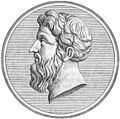Laconic Phrase facts for kids
A laconic phrase is a way of speaking that uses only the most important words to say something. It means being very brief and to the point. The word "laconic" comes from the ancient people of Sparta, who lived in a region called Laconia in Ancient Greece. They were famous for their short, sharp way of talking. This is why someone who can say a lot with just a few words is said to have "laconic wit" or to be using "laconic phrases."
Contents
What is a Laconic Phrase?
A laconic phrase is a short and clear statement that gets straight to the point. It's about being efficient with words, saying exactly what is needed and nothing more. Imagine trying to explain something complicated in just a few sentences – that's the idea behind being laconic. It shows cleverness and a strong understanding of what you want to communicate.
The Spartans and Their Way of Speaking
The ancient city-state of Sparta was famous for its powerful army and its strict way of life. Spartans were trained from a young age to be disciplined, brave, and strong. This focus on discipline also applied to how they spoke. They believed that too many words were a waste of time and could hide the truth. Instead, they valued clear, direct communication.
Their education system, called the Agoge, taught young Spartans to be tough and to speak briefly. They learned to express themselves powerfully without using extra words. This made their speech very impactful and often quite witty.
Why Spartans Spoke Briefly
Spartans were known for their practical approach to life. They focused on actions rather than long discussions. This meant that when they spoke, they wanted to be understood quickly and clearly. Their short phrases were often used in military situations, where quick and precise orders were essential. It also helped them avoid showing weakness or emotion, which was part of their warrior culture.
Famous Laconic Examples
One of the most famous laconic phrases comes from King Leonidas I of Sparta. Before the Battle of Thermopylae, the Persian king Xerxes I demanded that the Spartans surrender their weapons. Leonidas famously replied, "Molon Labe!" which means "Come and get them!" This short, defiant answer showed the Spartans' courage and refusal to give up.
Another story tells of a Spartan who was asked why his city had no walls. He pointed to his fellow Spartan warriors and said, "These are Sparta's walls." This meant that the strength and bravery of its people were more important than any stone walls. These examples show how Spartans used few words to make a very strong statement.
Images for kids
-
Bust of Philip II of Macedon
See also
 In Spanish: Laconismo para niños
In Spanish: Laconismo para niños
 | Leon Lynch |
 | Milton P. Webster |
 | Ferdinand Smith |





